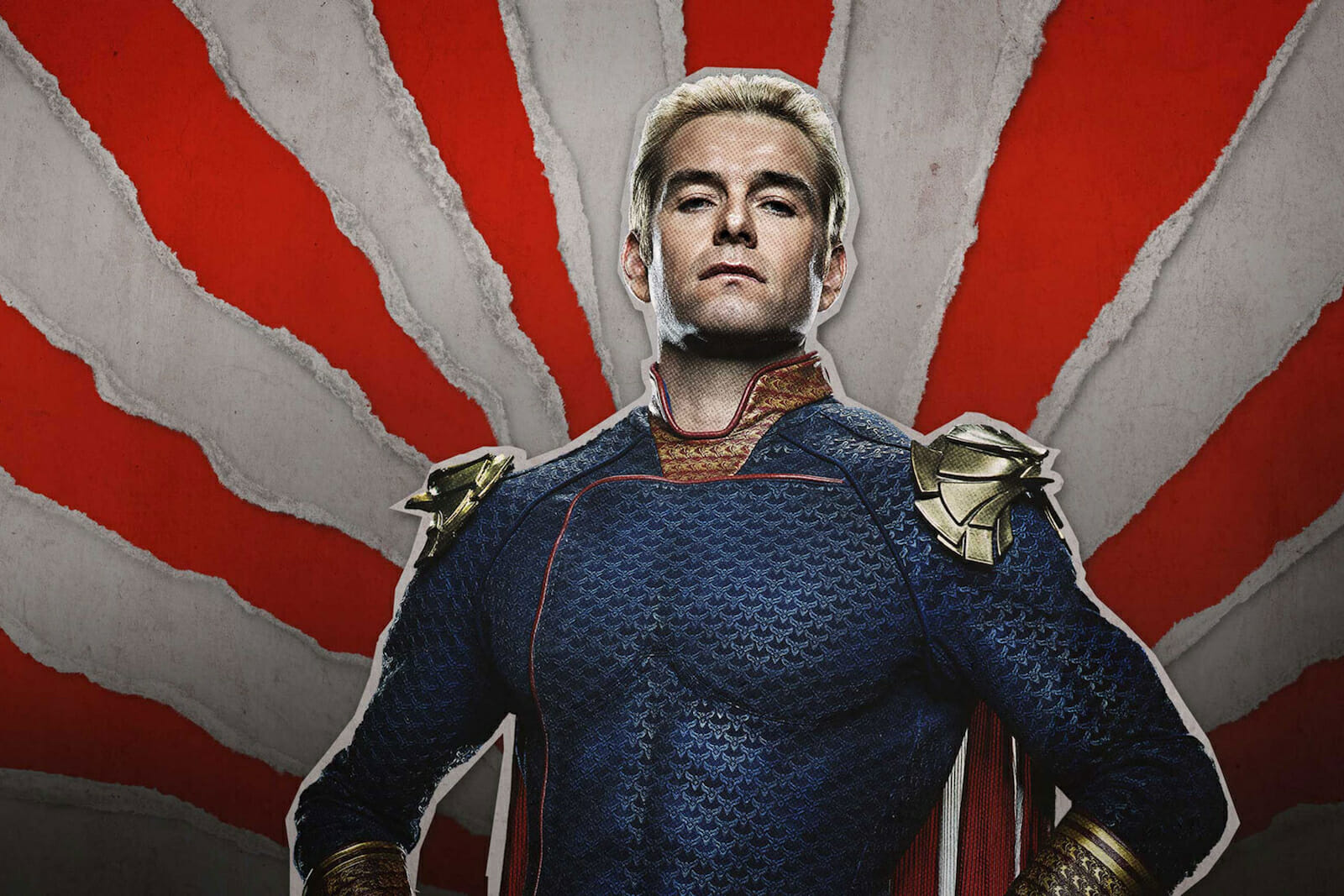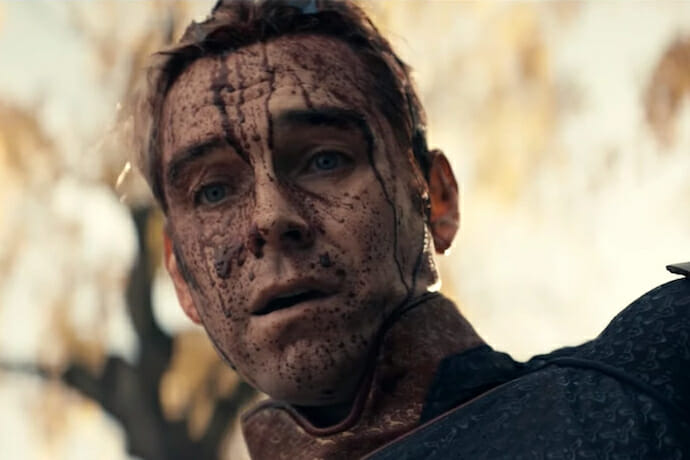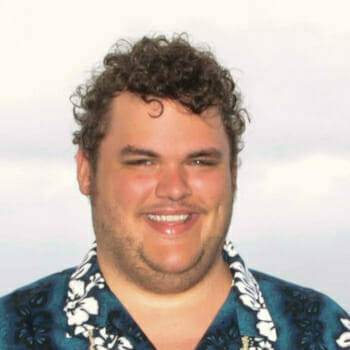
The Inherently Adolescent Nature of ‘The Boys’
Imagine, if you will, you’re a comic book geek in high school. There have always been hypothetical discussions in the realm of comic books, particularly among the young devotees who gather around the cafeteria table. The questions start off simple: who is the most ridiculous superhero? (For my money, it’s the obscure DC superhero Matter-Eater Lad, who, as his name implies, is capable of eating anything.) What superpowers would you like to have? (Personally, teleportation.)
But any geek’s rite of passage in the cafeteria-table discussion about superheroes is to answer the question “what if superheroes were real?” No question consumes fanboy conversation more, it has inspired countless hypotheticals and even great works including Alan Moore & Dave Gibbon’s Watchmen and Mark Millar’s Kick-Ass and, by extension, their respective film and TV adaptations. When I reflect on the breakout hit The Boys, the darker-edged, no-holds-barred superhero show on Amazon Prime, the show itself feels like an amalgamation of all those questions: what if ridiculous superheroes and power-sets co-existed with the banality of the modern world? What if not only superheroes existed, but they are intrinsically attached to everything good, bad, and ugly about corporate America? What if real-life superheroes, away from the mystique and grandeur, were the equivalent of our modern arrogant, publicity-obsessed celebrities? What if they were basically another thing in life that people just had to deal with?
But then, right around the time puberty hits, those hypothetical questions about real-life superheroes devolve into the immature, the silly, the gratuitous, and the crass: “Hey, what if there was a prehensile super-penis and its superpower was it could choke people?” “Hey, what if a super-woman was sitting on a guy’s face and his head exploded because her butt was too powerful?” “Hey, what if Superman was kind of a prick with an oedipal complex so severe he craves breastmilk?” “Hey, what if you could kill someone with impenetrable skin with an ass bomb?” (For those who haven’t watched the show, yes, all those things have happened at some point over the show’s two-season run.) The other thing about The Boys is that it gets self-indulgent, in the same way those high school cafeteria conversations would. That has left me with the conclusion that, as good as it can be and as fun as it is to watch, The Boys is, at its core, an unmistakably adolescent show. I don’t want to call it “juvenile” necessarily, so I decided it’s a notch above. It’s adolescent, it’s a high-school comic-book geek cafeteria discussion come to life, with everything, oh, and I do mean everything that comes with that. That is both one of its major strengths, as well as an underlying flaw.
For those unaware, The Boys centers on Hughie Campbell (Jack Quaid, son of Dennis Quaid and Meg Ryan). A speedster superhero named A-Train (Jesse T. Usher) accidentally runs over Hughie’s girlfriend Robin (Jess Salgueiro), killing her instantly. A-Train belongs to The Seven, this universe’s equivalent of the Justice League, only they are owned and operated by the powerful Vought Corporation. Hughie seeks revenge against The Seven and Vought, and in so doing, gets caught up with the titular Boys, a group of anti-superhero vigilantes who previously served as a secret CIA operation. There’s the de-facto leader Billy Butcher, played by Karl Urban, only adding to his geeky bona fides in a career that already includes Lord of the Rings, Dredd, and Star Trek. Butcher is a foul-mouthed brute whose disregard for decency is matched only by his lust for revenge against Vought. Like Hughie, he believes Vought is responsible for the death of his wife, though, as we eventually find out, that’s not the end of the story. There’s also Frenchie (Tomer Capon) and Marvin Milk AKA Mother’s Milk (Laz Alonso), two fellow assassins who join Butcher in his quest. Eventually, a super-powered mute girl from Japan named Kimiko (Karen Fukuhara) joins the team.

Meanwhile, a promising new superhero named Annie January AKA Starlight (Erin Moriarty) joins The Seven. She is not just naïve about just how much of her life will be controlled by the Vought Corporation, but also about how she will relate to the other superheroes on the team. She eventually learns to stand up for herself, which includes publicly revealing that the Aquaman-like superhero The Deep (Chase Crawford) sexually assaulted her. This rallies the public behind her and forces Vought to remove The Deep from the team. Also on the team is Homelander (Antony Starr in a star-making role), the leader of The Seven and the show’s ultra-American Superman surrogate; Queen Maeve (Dominique McElligott), a Wonder Woman-equivalent who is conflicted between her loyalty to Vought and her personal life; and Black Noir (Nathan Mitchell), a famously mysterious superhero who never talks. In the second season, another new superhero named Stormfront (Aya Cash) joins the team. The superheroes are all handled and managed by various Vought officials, including ambitious superhero liaison Madelyn Stillwell (Elizabeth Shue) in the first season, as well as overworked publicist Ashley Barrett (Colby Minifie) and CEO Stan Edgar (Giancarlo Espositio) in the second.
As Hughie and Annie/Starlight are the relative newcomers to their respective rival organizations, they mirror each other well, so naturally, they meet and fall for each other. But their respective team leaders, Butcher and Homelander, hate each other vehemently, and that ultimately bleeds into their relationship. While The Seven and Vought attempt to recover from a variety of public relations nightmares, The Boys work tirelessly to expose Vought for what they are. Outside the constantly-rotating lineup of The Seven, heroes like The Deep and A-Train attempt to get back into Vought’s good graces, including by becoming a part of a Scientology-esque cult. Finally, Homelander has discovered he has a son (Cameron Crovetti), and a swell of paternal pride soon becomes a quest to groom the boy into being his rightful successor.
At the end of the second season, we get a glimpse of Homelander furiously masturbating atop a New York City skyscraper while muttering “I can do whatever the fuck I want” to himself. It’s an image that initially shocks because of its inherent ridiculousness. It’s also very invocative of Homelander’s selfish, hedonistic nature. But, like many other moments on the show, it’s excessive, a Deadpool-esque winking to the camera, saying “this isn’t your daddy’s superhero romp!” It comes back to the high school cafeteria, and sounds like simultaneously the most ridiculous and the dirtiest image involving a superhero that a teenage mind could possibly conceive. Neither the show nor its original comic book source material by Garth Ennis and Darick Robertson were intended for children, so moments like these provide a feeling of getting away with something that would never be possible with the much more button-down, family-friendly Marvel and DC. But moments like these don’t resonate as much as they could, providing only a temporary amusement, and denying us more nuanced storytelling.
And then there are the times that just feel like “Welp, time to spend Mr. Bezos’ money!” This includes the constant appearance of Billy Joel songs throughout the second season. While eventually there is an in-universe explanation for Hughie liking Billy Joel so much, at a certain point, it just became obnoxious. Look, I love “Uptown Girl” as much as the next guy, but there is such a thing as too much of a good thing. The way The Boys uses Billy Joel’s music reminds me of the two kids singing the theme song to The NeverEnding Story in the finale of Stranger Things season 3, and how that took away all of the tension that the show had been building up to. Similarly, it can’t help but feel forced when Hughie and Annie/Starlight are literally singing along to “We Didn’t Start the Fire” on the way to their latest important mission. I’ve been driving around in my car listening to Kendrick Lamar’s masterpiece 2017 album DAMN. recently, thinking about how any of the songs on the album are a much better tonal fit for the show than any of the times they utilized Billy Joel’s music. Though I guess Kendrick’s music might be unavailable given his association with Marvel and Black Panther, he’s just one artist who comes to mind as being more relevant to this time than the freakin’ “Piano Man”! Couldn’t a show that feels so of the current moment at the very least reflect that in its choice of music?
While other shows thrive on subtlety, The Boys has to be overt about everything, including and especially its politics. Stormfront is revealed to be, rather than a current far-right radical, an actual 100-year old Nazi who used to hang out with Hitler himself, making it all the sweeter when Maeve, Starlight, and Kimiko gang up to beat the crap out of her in the season 2 finale. Homelander quotes George W. Bush’s speech from the aftermath of 9/11 verbatim after an airplane crash that he failed to stop. A prominent congresswoman character in the second season is clearly modeled after Representative Alexandria Ocasio-Cortez. (And, if what’s teased about her is as important as it seems, we’ll be seeing even more from here in seasons to come.) The Boys wears its politics on its sleeve, and that’s not necessarily a bad thing. But sometimes, the show can get distracted because it went out of its way to make a political statement when it should have been focused on plot, character, and structure. Reminiscent of its adolescent nature, the show oftentimes opts for vague political notions rather than concrete understanding, the equivalent of a high-schooler doing their homework at the last minute. The show would rather just mock the entire system with South Park-reminiscent anarchy and equal-opportunity offending.
While the superhero characters are, for the most part, interesting and well-developed, there is a lot to be desired when it comes to the titular Boys. Apart from Hughie and Butcher, I can’t tell you much about them. There’s nothing much to Frenchie and Mother’s Milk other than their respective motivations. Moreover, their respective relationships to Hughie and Butcher seem interchangeable, there’s simply not a lot there. Compare this to a lot of Joss Whedon’s shows, particularly Firefly, where each character’s relationship with one another was very distinctive and unique. Kimiko in particular feels like she gets done dirtiest by the show. It’s hard to pinpoint what exactly motivates her, and potential plot points like the promise of sparks between her and Frenchie seem muddled thus far. If the show can’t even nail the dynamics of relationships that are supposed to be years-old, it is understandable that an outsider like Kimiko would suffer worst of all. Again, how very adolescent of them to spend time making the male characters awesome and badass, only to drop the ball when it came to writing for the female of the species (which is what Kimiko was called in the original comics).
However, I would be remiss not to mention my favorite part of the show: the world-building. The show goes out of its way to make the universe feel very authentic and lived-in. Superheroes pop on packaging and advertisements, and you don’t give it a second thought. The logo for Vought Studios resembles the Marvel Studios logo to a T. In season 2, we are introduced to a Seven-themed restaurant called, of course, Planet Vought. In one of the show’s smarter moves, it actually tackled what religion would look like in a world with superheroes really effectively. Rather than being critical of religion, the show offers up instead that superheroes would take advantage of people and their faith, using a combination of superhuman powers and false piety for selfish gain.
The best shows nail something specific really well, and such is the case with The Boys. For example, it’s one of the rare shows where the choice of clothing matters. All the superhero costumes are very well done, invoking classic aesthetic themes that still feel relatively distinctive enough to differentiate this show’s superheroes from other comic book cinematic universes. The evolution of Annie/Starlight’s attire is the most intriguing, she has a very conservative superhero costume when she first joins The Seven, only to have a much more revealing costume imposed upon her by Vought. When she’s with Hughie and The Boys throughout season 2, particularly in episode 6, “The Bloody Doors Off,” I noted that she’s always wearing a lot of denim: matching blue denim jacket and jeans. She wears the same type of Converse sneakers Vice president-elect Kamala Harris might sport. Blue denim and Converse signals blue-collar; American; relatable. It relays to us, the audience, that despite all the glitz and glam of Vought, she is still just Annie January from Des Moines.
I really enjoy The Boys, but don’t consider it to be as revolutionary as many of its most vehement supporters claim it to be. In terms of depictions of superheroes in the era of “peak TV,” I much prefer the surreal weirdness and avant-garde take of something like Legion, or the heady ideas and inherently political nature of something like Watchmen. The Boys, while still good and entertaining, can’t help but feel like an also-ran in comparison to those two powerhouses.
But as more people gravitate towards the show, I’m afraid that some of the wrong messages will be taken away from it. The very notion that a Trump supporter came out dressed as Trump-as-Homelander at the Million MAGA March in Washington, DC, as if Homelander is some heroic figure, proves that not everyone who is watching the show seems to be cognizant of its themes and what it’s trying to convey. (Though, Homelander and Trump are both narcissistic sociopaths, so that, at least, checks out.) The show definitely has its strengths, and when it’s at its best, it’s able to channel them into unforgettable moments and an irreverent tone. The show’s second season was an overall improvement on its first, and it felt like the show came into its own in a lot of ways. But as the show grows more popular, I worry it might begin to overshadow other worthy superhero shows in this era of “peak TV.” As much as it pains me to say it, one guy dressed as Homelander at a Trump event is just the beginning. In terms of the discussion about the “great superhero shows for adults,” The Boys has earned a seat at the table. Let’s be careful not to elevate it any higher than that in the broader cultural discussion surrounding the show until it has the chance to work out the kinks in subsequent seasons.

